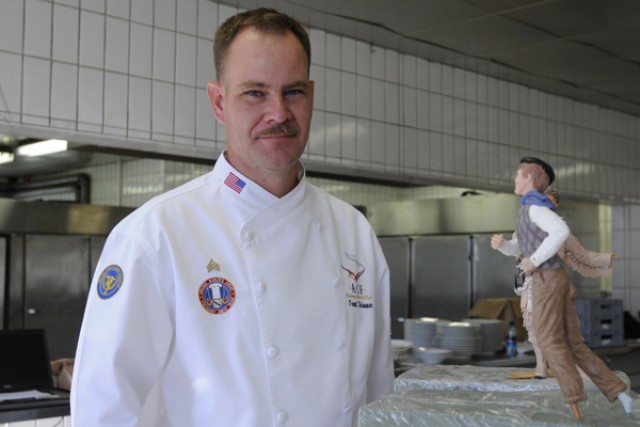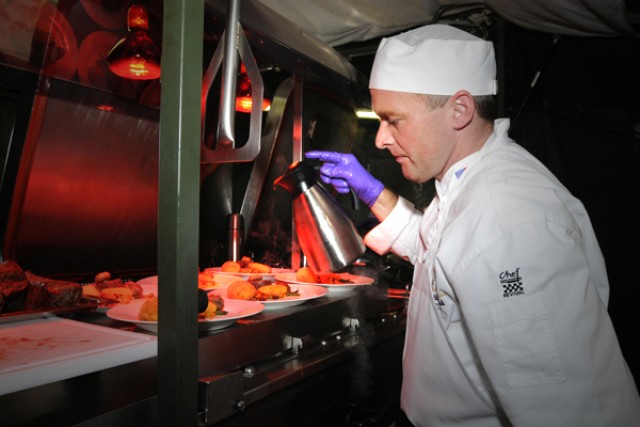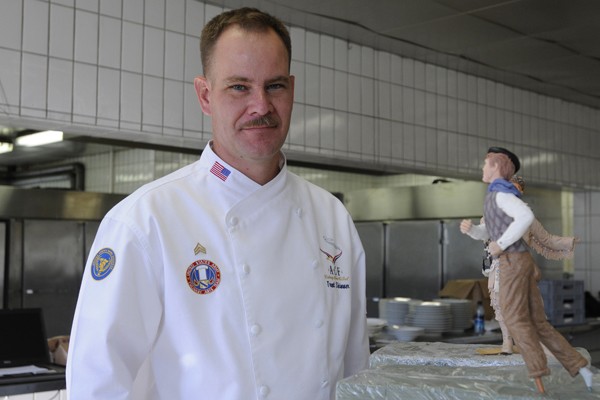GRAFENWOEHR, Germany -- Among steaming pots and scorching ovens in a crowded canvas tent, the United States Army Culinary Arts Team from Fort Lee, Va., are preparing for the Culinary World Cup in Luxemburg from Nov. 20-24.
The USACAT is training to win the gold in the Culinary World Cup this year. They are competing against seven other international military culinary arts teams.
"We're going to compete against seven other nations, so there are eight nations going head-to-head. We compete against each other, but the standard that we are judged by is the World Association of Chefs Society standards," said Chief Warrant Officer 4 Russell Campbell, the manager of the team. "Everyone starts off with the maximum points allowed, and based on our performance from sanitation to food preparation (taste, flavor, "doneness") that's where we can lose points."
The Culinary World Cup is hosted in Luxemburg every four years along with the Expogast Trade Show. The world cup involves many different types of culinary competitions, including an international military culinary competition.
"To be in the military and to have this level of culinary skill is fantastic. To be a part of a team that's recognized globally as the best culinary team of the Department of the Defense is fantastic," said Master Sgt. Jason Gray, a member of the team and a culinary instructor in the U.S. Air Force. "For me personally to bring that joint aspect to it as an Air Force guy and to compete with some of the best chefs in the world; that's who you want to compete with."
To prepare for the world cup the team is training for their culinary performance at Camp Kasserine at Grafenwoehr Training Area three times a week. During the Culinary World Cup, the teams get five hours to prepare a hot three-course meal for 100 guests, and they have 24 hours to prepare a cold dish table display with seven three-course meals, using only the materials they have on site. Three times a week they simulate their performance exactly as they will do when they compete at the World Cup.
"It's an excellent opportunity for us to simulate the competition environment at Grafenwoehr. We have similar equipment," said U.S. Coast Guard Petty Officer Edward Fuchs of USACAT. "Without this type of advantage, it would be a lot harder to pull off this kind of cooking on an American-style trailer. Being able to use the European-styled equipment, which is what we will be using in the competition, is a huge advantage for us."
Being a chef in the military does not automatically get a spot on the U.S. Army Culinary Arts Team. Soldiers compete to be a part of the team, and to compete internationally.
"For all the chefs that are here whether they're in the Army, Air Force, Reserve, or Coast Guard, it allows them an opportunity to display the talents that they have, and that they've developed over the years in the military. This allows us to show that we have great chefs in the U.S. Military," said Campbell. "The chefs compete to earn a spot on the team; not everyone can be here, and hopefully it motivates their peers to cook well, be great chefs, and bring those skills back to the Soldiers in the dining facilities or on the battlefield."
Although the chefs are now competing in the Culinary World Cup, they are not exempt from some preconceptions that many people have of chefs in the military.
"One of the common preconceptions is that we're only cooks, [that] we arrive for duty, make 300 servings of mashed potatoes and that's the extent of our expertise," said Sgt. Ken Turman, an apprentice in the team who is stationed in Italy as part of U.S. Army Africa. "But, when I began learning my job, I didn't realize how many different opportunities there are for a cook in the military. You can be a cook for a general (enlisted aid), or you could do the CEE20 program where you're cooking on military planes, or you can rise to eventually be an instructor for the advanced school at Fort Lee, then working at the Pentagon, or the White House."
Turman said, if you work hard, you can get where you want in the Army.
The chefs said there is more to the competition than just cooking. The team is also judged on the visual appeal and presentation of the meal, the table and the food.
A new member of the team, a professional sculptor, was added to make the edible centerpieces that decorate the tables. His designs add continuity and support the overall quality of the presentation.
"The centerpieces are really the cherry on top. Normally in teams, each person makes their own personal centerpiece," said Sgt. Trent Skinner from Las Vegas, Nev., an Army Reserve Soldier and a freelance sculptor. "However, we're trying to keep continuity in the way that everything looks and feels. There are other people here that could make pretty good centerpieces, but we just want them all to look the same."
Related Links:
Fort Lee Quartermasters hone tactical skills during field exercise




Social Sharing